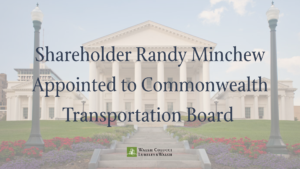
One of the risks involved with purchasing property at a foreclosure sale is that the prior owner may attempt to challenge the validity of the sale. Often, the challenge to the foreclosure sale is an attempt to avoid or delay eviction after the foreclosure, as the Supreme Court reviewed at length in its ruling in Parrish v. Fannie Mae, 292 Va. 44 (2016). These challenges may also result in a claim on the new owner’s title insurance policy.
On April 2, 2020, the Supreme Court of Virginia issued an opinion that clarifies and further limits the ability of a foreclosed property owner to rescind a completed foreclosure sale. In Young-Allen v. Bank of Am., N.A., 839 S.E.2d 897 (Va. 2020), a property owner in the City of Alexandria facing foreclosure requested a reinstatement quote from the lender prior to foreclosure. The lender did not respond to that request and, despite the property owner’s request that the lender postpone the sale to give her time to reinstate the loan, proceeded with the foreclosure.
On the day before the foreclosure, the property owner filed a suit in the Circuit Court of Alexandria alleging that: (i) the lender breached the terms of the deed of trust by failing to provide the requested reinstatement figures, (ii) the foreclosure trustee breached its fiduciary when it refused to cancel or postpone the scheduled foreclosure sale despite request, (iii) the lender did not have the authority to conduct the foreclosure sale, and (iv) requesting that the Circuit Court rescind any foreclosure sale that might occur during the pending litigation. The property owner also filed a memorandum of lis pendens in the land records of the City of Alexandria on the same day. The following day the trustee performed the foreclosure sale and the property was sold to a third-party bidder.
Following the foreclosure sale, the property owner amended her Complaint. In the Amended Complaint the property owner continued to ask the Court to rescind the sale, among other relief requested. The lender and foreclosure trustee filed demurrers to the Amended Complaint, arguing that the Amended Complaint failed to state a cause of action upon which the Circuit Court could provide relief. The Circuit Court for the City of Alexandria sustained the demurrers and dismissed the Amended Complaint with prejudice. The property owner appealed to the Supreme Court of Virginia.
On appeal, the Supreme Court of Virginia affirmed the circuit court’s decision. The Court noted that rescinding a foreclosure sale “is a remedy which calls for the highest and most drastic exercise of the power of a court of chancery—to annul and set at naught the solemn contracts of parties.” The Court also stated that “[g]enerally, a court will not rescind a completed foreclosure sale”.
The Court did note that there are “potential exceptions” to the rule that a foreclosure sale cannot be rescinded. These exceptions include: (a) the failure to properly advertise under Everette v. Woodward, 162 Va. 419 (1934), (b) the sale of the property after the secured debt has been satisfied under Smith v. Woodward, 122 Va. 356, (1918), or (c) when the underlying debt was procured through fraud under Wasserman v. Metzger, 105 Va. 744 (1906). The Court also cited collusion between the foreclosure trustee and the purchaser, along with a foreclosure sale price of such gross inadequacy that it shocks the conscience of the court as grounds for rescission. However, it should be noted that absent any evidence of fraud, a foreclosure sale will not be set aside for an inadequate price alone. Squire v. Va. Hous. Dev. Auth., 287 Va. 507, 519, (2014).
In addition to limiting and clarifying the circumstances under which a foreclosed property owner can seek to rescind the foreclosure sale, the Court also commented upon the liability of foreclosure trustees, thus further clarifying a ruling the Court had recently made in Crosby v. ALG Tr., LLC, 296 Va. 561 (2018). In Crosby, the Court ruled that it may be possible for a deed of trust obligor to file a suit against a trustee of a deed of trust for breach of fiduciary duties not specifically identified in the deed of trust. However, in Young-Allen, the Court ruled that as a baseline premise to any claim against a trustee, the property owner must allege that she suffered actual damages and could have reinstated the loan in order to satisfactorily set out a claim against a deed of trust trustee for breach of fiduciary duty.
Finally, the Court noted that filing a memorandum of lis pendens is not sufficient to cause a trustee to forestall a foreclosure. The Court confirmed that a memorandum of lis pendens is merely a notice to the world of the pendency of a judicial proceedings and that, in and of itself, is not sufficient to prevent the trustee from foreclosing.
The Supreme Court of Virginia has, in recent years, addressed a number of issued related to foreclosure. Young-Allen v. Bank of Am., N.A. may prove to be a valuable tool for foreclosure purchasers facing a challenge to the validity of the foreclosure sale.
If you have any questions about foreclosures or foreclosure sales, please contact John Rinaldi.






